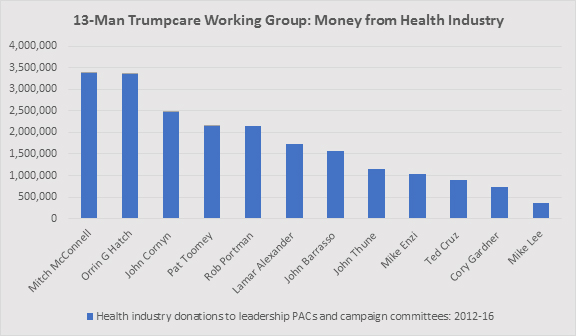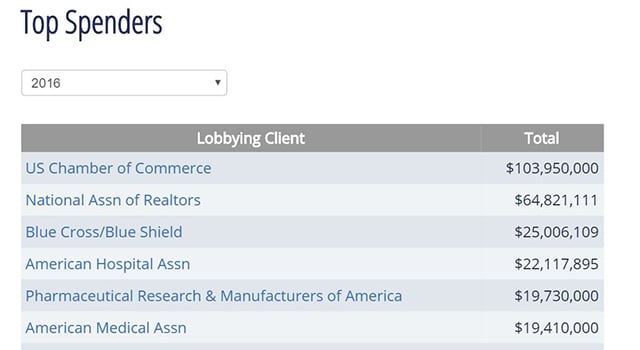
Part of the Series
Fighting for Our Lives: The Movement for Medicare for All
When the Congressional Budget Office released its score of the GOP’s contemptible House bill last week, confirming, among other things, that it would add 23 million to the ranks of the uninsured and raise premiums for seniors by 800 percent, the public erupted with anger. It didn’t take long, however, for the media to pivot away from the politics of health care and back to the Comey/Trump/Russia scandal that has dominated the top headlines for the last month.
The same thing happened earlier this month after the House’s American Health Care Act (also known as the AHCA or Trumpcare) passed on May 4. Health policy had become the biggest subject on the national agenda, getting attention from both dominant and independent media outlets and activists both online and off. But this was fleeting, as just five days later, Trump fired FBI director James Comey, sparking a slew of new scandalous reports. Health policy nearly evaporated from the news cycle as the US watched Trump’s various scandals unfold each day.
This shift in the nation’s attention is no doubt good news for the private, for-profit health industry, whose leaders want nothing more than to shape health policy in the dark, away from prying eyes, in a country where both Congress and insurance companies are less popular than root canals.
There is hope among some liberals that Trump’s many scandals will distract the Republicans, and force them to expend political capital defending the president. But, as consumer advocate Wendell Potter tells Truthout, the scandals could also serve to distract the American public and the media just as the reform process reaches the Senate — a place where the industry is owed a lot of favors.
“With health care no longer at the top of the news cycle, the industry’s work is being done in stealth,” said Potter, a former CIGNA insurance executive who famously turned whistleblower and spoke out about the industry’s greed and cruelty at congressional hearings. “It is entirely possible that they will be able to sneak things in that really undermine the ACA.”
Indeed, to understand the machinations of health reform in DC it is imperative to follow what the insurance and drug lobbies — among the most powerful in Washington — are doing. To understand the kind of influence insurance lobbyists yield in DC, one only need look back to the creation of the Affordable Care Act (ACA) or Obamacare, which heavily relied on the industry for input: Former WellPoint executives wrote much of the bill.
Republican Senator Bill Cassidy has insisted any legislation must pass a “Jimmy Kimmel Test,” which would require a law to (actually) cover those with pre-existing conditions. But beyond Kimmel and the public, politicians will also be graded by power brokers in the for-profit health care industry, whose priorities will be quite different. Only an engaged public and insistent media stand a chance at countering the pervasive influence of these corporate giants.
Repeal Debate Reaches a Compromised Senate
Senate Majority Leader Mitch McConnell appointed himself and 12 other men (and no women) to craft legislation in the Senate. It is a safe bet that, unlike with the House bill, which was passed so quickly some members of the House couldn’t read it in full, industry will play a major role in this process.
The Senate plans to move at a more deliberate place. And it’s likely the insurance companies will have a concerted influence on the shape of the bill: As the Center for Responsive Politics’ data shows, the health care industry has given these 13 men plenty of incentive to bend to its wishes, including $18.1 million in donations since 2012.
Every single member of this working group has been a recipient of industry dollars: McConnell ($3,667,264), Orrin Hatch ($3,355,661), John Cornyn ($2,480,031), Pat Toomey ($2,151,128), Rob Portman ($2,142,106), Lamar Alexander ($1,725,507), John Barrasso ($1,575,226), John Thune ($1,146,896), Mike Enzi ($1,026,725), Ted Cruz ($904,492), Cory Gardner ($735,260) Tom Cotton ($509,735) and Mike Lee ($355,157).
 (Source: Michael Corcoran/Truthout based on data from the Center for Responsive Politics)
(Source: Michael Corcoran/Truthout based on data from the Center for Responsive Politics)
The Democrats have happily taken that money as well, most notably Minority Leader Chuck Schumer, who has received 2.7 million from the industry. Even progressives like Elizabeth Warren and Sherrod Brown are not clean, having received about $1.3 and $1.6 million respectively. These industries understand that in Washington, influence is the most important currency.
The ACA Demonstrates Industry’s Power
The tight relationship between the health industry and the senators who may yet determine the fate of the 23 million Americans is extremely worrying. We need only look at the way in which the Obamacare law came to exist to understand the depth of the industry’s power.
Critics argue the ACA has been bad for the industry. However, while there is some volatility on the exchanges in the (relatively small) individual market, and costs are still rising, both these problems were true before Obamacare existed. Overall, the ACA has been good for the industry’s bottom line.
“The industry has done quite well under the ACA,” said Dr. John Geyman, the author of numerous books and a health care pamphlet modeled after Tom Paine’s Common Sense, in an interview with Truthout. “They have millions of new customers and have made plenty of money.”
In fact, in negotiations leading up to the Affordable Care Act, President Obama was eager to give industry a “seat at the table,” and made numerous concessions to them. “Health Insurers Have Already Won,” said the cover of a Business Week article published in August of 2009, seven months before passage of the bill. “Insurers and pharmaceutical manufacturers that appeared vulnerable to a regulatory crackdown have been welcomed to the negotiating table by the President’s own party,” the article said.
The president never entertained single-payer health care as an option. He also caved on his proposal for a “public option,” which would have allowed for a limited public plan to compete on the individual marketplace. Under pressure from private insurers, this plan died, as did a proposal to lower the age for Medicare beneficiaries.
While Obama did extract concessions from industry by regulating minimum essential benefits, preexisting conditions and a cap on out-of-pocket expenses, the industry got plenty in return. This included an individual mandate, which effectively forced Americans to patronize immoral insurance companies with fairly weak products, even accounting for some of the ACA’s improvements.
The day the ACA passed, drug and insurance stocks went up considerably. Sen. Bernie Sanders “was not pleased with the bill at the time … he wanted single-payer and wielded a lot of power because he could take the whole bill down with a no vote,” reported the Hill. “A former senior White House official said Sanders ‘was one of the most difficult people I’ve ever had to deal with … he hated what we were doing.'”
Sanders, who reluctantly voted for the bill after leveraging for money for community health centers, lamented that insurers were no doubt celebrating the ACA’s passage.
Although the ACA did dramatically improve access to care, the industry was hardly the victim of a progressive crusade for socialized medicine, as Republicans allege. Industry had far more input and influence on the law than did progressives.
“They’re making scads of money from Obamacare — so much that almost universally, they’re expanding their participation,” reported the Los Angeles Times in February 2016. The big profits have come not from the plans on the insurance exchanges, but via the ACA’s Medicaid expansion, in which the largest insurers play a major role. The same insurance executives who go out of their way to badmouth the ACA’s individual exchange plans talk as though they can’t get enough of the Medicaid business, especially its managed care component.”
How Private Insurance Companies Profit off Medicaid Expansion
Almost everyone in the US disliked the GOP House’s version of Trumpcare, which is only supported by 17 percent of the public. This is understandable. With $880 billion in cuts to Medicaid and a radical proposal to impose block grants, the bill repeals Medicaid as much as it does the ACA. The GOP plan would result in 43,000 preventable deaths each year. Unless you are among the wealthy few who benefit from the plan’s massive tax cuts, there is little to like about Trumpcare.
One critic of AHCA, however, may seem a bit curious: private health insurance providers. Not a day passed after the GOP celebrated the passing of this horrid bill, the powerful private insurance lobby American Health Insurance Plans (AHIP) issued a statement arguing the bill “needs important improvements to better protect low- and moderate-income families who rely on Medicaid or buy their own coverage.” The Blue Cross Blue Shield Association was similarly negative about House cuts to Medicaid.
It can seem odd that health insurance companies would be so down on a bill that radically deregulates the market and allows them to charge more for weaker health plans. The insurance industry, however, has real reservations over the plan. A chief concern is the Medicaid cuts. Private insurers, in partnership with the states, service Medicaid plans — and reap sizable profits, as the Los Angeles Times article noted.
“This is where [insurance companies] see the most growth coming from. It is far more important to them than the individual marketplace,” Potter told Truthout.
How do public health care programs benefit private insurers? The US already publicly finances 60 percent of health spending, according to a study in Health Affairs — enough to cover everyone if the system were efficient. But in the US, wasteful private insurers serve as a middleman and profit greatly as a result.
AHIP released a report in May 2016 that praised Medicaid’s cost effectiveness, accessibility and quality of care. “Medicaid health plans have demonstrated a track record of improving health care for Medicaid beneficiaries while ensuring that the federal government and state Medicaid programs receive the highest value for the dollars they spend on health care,” the report concludes. “AHIP will be working with state and federal leaders to promote policies supporting and expanding Medicaid health plan efforts to maintain and improve the health of the low-income” (emphasis added).
This dynamic is illustrated by a 2012 report from the Center on Budget and Policy Priorities, which states: “As advocates work to convince state policymakers to expand Medicaid, private insurers could be critical allies,” as managed care providers have “a clear financial interest in ensuring that as many states as possible expand their Medicaid programs.”
The trade organization Medicaid Health Plans for America, which lobbies for insurers who administer Medicaid plans, has a board of directors made up of CEOs of insurance companies. The organization wrote a letter on March 22 pointedly telling Speaker Paul Ryan they “cannot support,” their Trumpcare plan, arguing it would “destabilize state Medicaid programs,” and “create unmanageable problems for the most disadvantaged Americans.”
The Drug and Insurance Lobbies Flex Their Muscles
This support for Medicaid, however, should not be confused with compassion. “The industry’s primary goal is to make sure any reform maximizes their ability to provide profit for their shareholders,” said Potter, who is currently forming a new news outlet, Tarbell, which aims to shine a light on “how moneyed interests touch the lives of average Americans.”
Indeed, despite critiquing Medicaid cuts, AHIP is open to per-capita spending limits — which would determine federal funding for Medicaid based on the number of enrollees, not the cost of the care. This would almost surely result in major state cuts to Medicaid that would reduce benefits or further restrict eligibility. Accordingly, insurance companies can hardly be described as advocates for low-income Americans. If legislators can find a way to help insurers profit more, the industry would likely have no problem with the House bill. Indeed, AHIP has praised many aspects of the bill that pertain to the individual market, including premium hikes for various “consumers” and the creation of high-risk pools that punish those with pre-existing conditions.
“The American Health Care Act includes many essential steps for stabilizing the individual market, including continuing premium tax credits, funding for states to stabilize risk pools, more flexibility for states, and elimination of many taxes that drive up consumer costs,” said AHIP in a statement during earlier stages of the GOP reform efforts.
Drug manufacturers have been much more quiet about the passage of the AHCA. However, their stocks have been doing quite well since the original bill started to take shape. The powerful drug lobby Pharmaceutical Research and Manufacturers of America, according to the Center for Responsive Politics, spent $20 million in lobbying in 2016 alone — the most it has spent since the Obamacare debates of 2009-10. In fact, in 2016, four of the top six lobbyists in terms of spending were in the health sector:
 (Source: Center for Responsive Politics)
(Source: Center for Responsive Politics)
They lobby members of both parties aggressively. It was only a few months ago that Cory Booker and 12 other Democratic senators with financial ties to Big Pharma voted against a bill that would lower the price of drugs, angering progressives who had connected these dots.
Keeping an Eye on the Power Behind the Powerful
House Republicans were rightly chastised by constituents after voting for the AHCA, just as Booker was rightly attacked for his vote on prescription drugs. But the powerful forces behind these politicians rarely face that kind of scrutiny.
“Power is tied to money. Politicians in America enact policies shaped by this power,” notes the site for Potter’s developing project, Tarbell. “There is not enough information to help people understand how this relationship impacts their lives.”
Indeed, as the debate over health care reform continues — including the growing push for a single-payer system — it is important to remember that this is not just an ideological battle between politicians or a rational battle over policy. It is, as much as anything else, a fight with and among owners of capital who seek to influence policies to their benefit.
In the coming months, activists, organizers and independent media outlets need to shine a light on these industries. Those who profit from people falling ill have near-endless resources and access to power. For members of Congress to give their constituents the attention they give to these powerful lobbies, it will require ceaseless engagement by those committed to health care justice.
Media that fights fascism
Truthout is funded almost entirely by readers — that’s why we can speak truth to power and cut against the mainstream narrative. But independent journalists at Truthout face mounting political repression under Trump.
We rely on your support to survive McCarthyist censorship. Please make a tax-deductible one-time or monthly donation.